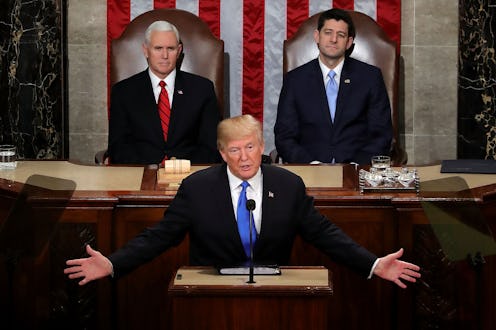
On Tuesday night, Donald Trump delivered his first State of the Union address to Congress. Tucked in his long speech was a remark that became immediately controversial. Trump said, "Americans are dreamers, too" in his SOTU speech — a comment that has been roundly criticized as dangerous and divisive.
"My duty, and the sacred duty of every elected official in this chamber, is to defend Americans — to protect their safety, their families, their communities, and their right to the American Dream," Trump said on Tuesday. "Because Americans are dreamers, too."
There are quite a few problems with Trump's comment. For starters, American citizens are not undocumented immigrants at risk of deportation and increased surveillance. Recipients of the Deferred Action for Childhood Arrivals (DACA) program, who are often referred to as Dreamers, have been stuck in limbo since Trump declared he would end the program protecting some 800,000 young immigrants from deportation. His administration has ramped up the crackdown on undocumented immigrants at large, going so far as to defy Congress' order for a stay on the deportation of a man who has lived in the U.S. for decades.
Saying "Americans are dreamers, too" further fans the flames of anti-immigration sentiment. It pits American citizens against young undocumented immigrants, and implies that the economic, political, and social aspirations of American citizens are threatened by DACA recipients if they are granted legal status. It suggests that these young undocumented immigrants are standing in the way of Americans from realizing their full potential. And for those listening in, it marked yet another instance of the president dismissing the lives and experiences of Dreamers, many of whom have been in the U.S. for most of their lives.
By saying "Americans are dreamers, too," Trump is seizing the term "Dreamer" from immigrants and applying it to American citizens — and American citizens alone. Ironically, this comes from a president who said in that same speech that he wanted to bring people "together":
Tonight, I want to talk about what kind of future we are going to have, and what kind of nation we are going to be. All of us, together, as one team, one people, and one American family. We all share the same home, the same heart, the same destiny, and the same great American flag.
Twitter user @everywhereist pointed out, "'Americans are dreamers too' is so underhandedly hateful, I can barely comprehend it. It reinforces the idea that Dreamers, who have lived here all their lives, are not Americans. It implies that the dreams of citizens and the dreams of aspiring citizens are mutually exclusive."
And what's more, in his speech, Trump also painted undocumented immigrants as violent groups who steal jobs from hardworking Americans. "For decades, open borders have allowed drugs and gangs to pour into our most vulnerable communities," Trump said. "They have allowed millions of low-wage workers to compete for jobs and wages against the poorest Americans. Most tragically, they have caused the loss of many innocent lives." (Studies have found that immigrants are far less likely to commit crimes than people born in the U.S.)
Perhaps most telling about the impact of this quote is that white supremacists have rallied behind it. Former Grand Wizard of the Ku Klux Klan David Duke praised the president on Twitter, saying, "Thank you, President Trump. Americans are Dreamers, too." Alt-right leader Richard Spencer tweeted Trump's remark with a stock photo of a white family, and scores of other white supremacists interpreted his comment as backing their white utopia.
Trump stuck to the script in his State of the Union speech on Tuesday; his comment, "Americans are dreamers, too," was a prepared remark. And that alone — those four dangerous words — should tell you plenty about how he will continue to approach immigration policy, as well as the extremist groups it will continue to embolden.
This op-ed solely reflects the views of the author, and is part of a larger, feminist discourse.